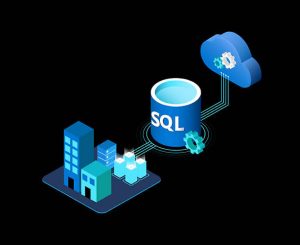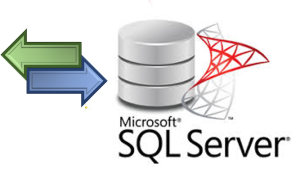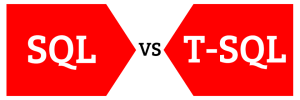Distinguishing Between SQL and SQL Server: In the realm of data management, SQL and SQL Server are frequently used terms. Although both terms include “SQL,” they are not interchangeable. This article will explore the differences between SQL and SQL Server.
What is SQL
SQL, which stands for Structured Query Language, is a programming language used to generate schema and manage data in relational databases. It allows users to store, alter, and retrieve data from databases through the use of queries.
The language was initially created in the early 1970s by Donald D. Chamberlin and Raymond F. Boyce of IBM.
SQL has become the industry standard, with ANSI (American National Standards Institute) and ISO (International Organization for Standardization) standardization in 1986 and 1987, respectively.
It is important to note that while SQL commands and queries can be written in any language, an RDBMS (Relational Database Management System) like SQL Server or Oracle is needed to execute them.
Additionally, SQL is Divided into Sub-Languages
Data Definition Language (DDL) is a programming language used to create and modify database objects. It includes SQL commands that create and delete databases, tables, indexes, and users.
Data Manipulation Language (DML) is a programming language that allows database users to access and modify data in a database organized using data models. DML includes commonly used SQL statements like SELECT, INSERT, UPDATE, and DELETE.
Data Control Language (DCL) is a programming language used to control access to database data and security. DCL commands include GRANT and REVOKE.
Transaction Control Language (TCL) is a relational database transaction control language that includes commands like COMMIT, ROLLBACK, and SAVEPOINT.
Doctrine Query Language (DQL) is a language used to perform queries on data within schema objects. DQL is essentially a component of SQL that allows users to retrieve and sort data from the database using SELECT statements. While some experts do not classify DQL as part of the base grouping of SQL sub-languages, it is widely used.
While most relational database systems, including MS SQL Server, IBM DB2, Oracle, MySQL, PostgreSQL, and Microsoft Access, use standard SQL, they also include non-standard native extensions of the language.
What is SQL Server
Microsoft SQL Server, or MS SQL Server, is a relational database management system (RDBMS) designed to store and manage large amounts of data. It was developed by Microsoft in 1989 for business purposes and is proprietary software created using the C and C++ programming languages. SQL Server runs SQL commands and queries to modify a relational database and manages all database activities.
The SQL Server is available for various platforms and is platform-specific software. It is supported on both Microsoft Windows and Linux operating systems. T-SQL (Transact Structured Query Language) is the variant of SQL that SQL Server uses, which is nearly identical to SQL with some differences in query syntax. The most recent version of SQL Server, version 15.0, was released in 2019.
Compared to other RDBMS, SQL Server is reported to be user-friendly and offers more functionality. It provides command-line and GUI (Graphical User Interface) options for easier user operations. SQL Server also receives regular security and operational updates, contributing to its popularity among users.
The Main Differences Between SQL and SQL Server
SQL is a query language that works with relational databases, while SQL Server is a proprietary software that executes SQL queries and provides additional features to manage databases. SQL was created by IBM in the 1970s and standardized by ANSI and ISO in 1986 and 1987, respectively, while SQL Server was developed by Microsoft in 1989 for commercial use.
The purpose of SQL is to create commands that specify the structure of relational databases and manipulate data, while SQL Server is a database management system that implements SQL commands and queries. SQL queries can be used on any computer, regardless of the operating system, while SQL Server is platform-dependent proprietary software.
There are no updates available for SQL as it is a widely used query language with consistent syntax. In contrast, SQL Server is proprietary software that is constantly updated, with different editions that offer varying features. SQL has a wide range of applications for constructing relational database schemas and manipulating or retrieving database data, while SQL Server has both command-line and GUI modes for efficient database management.
What is T-SQL
T-SQL, short for Transact-SQL, is a programming language developed by Sybase and Microsoft that extends the capabilities of the Structured Query Language (SQL) and is mainly used in Microsoft SQL Server. Essentially, T-SQL offers all the functionality of SQL while providing additional features, making it somewhat of a dialect of SQL.
SQL vs. T-SQL: Understanding the Differences
- Purpose and Scope: SQL is a query language used for manipulating data stored in a database, while T-SQL is an extension of SQL primarily used in Microsoft SQL Server databases and software. T-SQL contains almost all of the features of standard SQL and has more features and functions.
- Paradigm: SQL is a non-procedural programming language, while T-SQL is a procedural language.
- Developed by: SQL was developed by IBM, while T-SQL was developed by Microsoft.
- Distribution: SQL is open-source, while T-SQL is a proprietary standard owned by Microsoft.
- Usage: SQL is mainly used for executing simple queries to manipulate and analyze data, while T-SQL is mainly used for creating application logic.
- Server Interaction: SQL queries are submitted individually to the database server, while T-SQL does not have direct interaction with the database server.
Conclusion
In addition, T-SQL is an extension of SQL that adds extra features and functions, primarily used in Microsoft SQL Server databases and software. It contains almost all of the features of standard SQL, making it a powerful tool for creating application logic.
Understanding the differences between SQL, T-SQL, and SQL Server is important for anyone working with relational databases, as it can affect the way in which data is managed and queried. By utilizing these tools effectively, businesses can improve their data management and gain valuable insights into their operations.
It is important for organizations working with SQL Server databases to choose the right tools that can deliver significant business value and outcomes, regardless of their size. According to Statista, SQL Server ranks third among the most popular relational database management systems in 2022, following Oracle and MySQL.
This highlights the importance of selecting the appropriate tools to effectively manage and optimize SQL Server databases to ensure the best possible performance and results. Devart offers top-notch dbForge SQL Tools for developing, managing, and maintaining Microsoft SQL Server databases, making it one of the best options available on the market. The bundle of SQL Tools provides a wide range of tools to handle almost any task related to databases and can be a valuable factor that sets your SQL Server projects apart.







